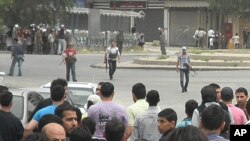Syrian activists say a double bomb attack near security buildings in the northwestern town of Idlib has killed at least 20 people, as a bombing campaign against Syrian government targets intensifies.
A separate grenade attack Monday struck the Syrian Central Bank in Damascus, wounding four security officers.
The Britain-based Syrian Observatory for Human Rights said the attack in Idlib targeted intelligence offices used by the Syrian army and air force. Syria's state news agency said suicide bombers triggered the blasts and it gave a lower death toll of at least nine, with another 100 people wounded, including security personnel and civilians.
Casualties could not be independently confirmed.
Syrian state television broadcast the aftermath of the Idlib attack, showing smashed cars, damaged buildings and mangled bodies.
Syrian state television blamed what it called “terrorists” for Monday's attack, and state-run media gave a lower death toll of at least nine with another 100 people wounded, including security personnel and civilians. Casualties could not be independently confirmed.
Speaking to Alhurra TV, General Mustafa al-Sheikh, a senior member of the opposition Free Syrian Army, alleged the Syrian government itself was behind Monday's blasts, as well as a Friday bombing in Damascus.
"The explosions are clearly the work of the Syrian government, because the government is trying to convince the West that it is fighting against terrorism," he said. "The government wants to convince U.N. observers that it is impossible to withdraw troops from urban areas or allow demonstrations because it is facing terrorists and al-Qaida."
Syrian TV reported that members of the U.N. observer team visited the Idlib blast sites. Foreign Ministry spokesman Jihad Makdissi said the head of the observer team was “being briefed on armed violations” of the 18-day old U.N. cease-fire.
The Syrian government and rebels accepted a U.N.-backed truce agreement, part of a peace plan mediated by international envoy Kofi Annan, that took effect on April 12. But forces loyal to Assad have continued assaulting opposition hubs while rebel fighters have repeatedly ambushed government security personnel. Each side accuses the other of provoking attacks.
Middle East scholar Fouad Ajami of the Hoover Institution said recent U.N. diplomacy and a cease-fire brokered by special envoy Kofi Annan appear to be working in favor of Syria's government.
"I think [Syrian President Assad] has had a good fortnight. He believes that diplomacy has made this revolution, this rebellion, a murky affair," said Ajami. "I think he believes that the moral clarity of this rebellion has been lost, and he believes that [world] powers will not come to the rescue."
But, Ajami added, it is impossible to determine who is winning the conflict.
"The basics have not really changed," he said. "The regime is running out of money, the regime is running out of resources; it's betting that the rebellion would be running out of stamina. And the great standoff still persists."
Syrian state media also reported grenade attacks Monday on the Syrian Central Bank and a police patrol in Damascus. It said four officers were wounded and the bank sustained light damage.
Elsewhere, Lebanese security officials said several skiers were fired on from the Syrian side of the mountainous border. One Lebanese skier was wounded. Syrian troops previously have fired across the border on suspicion of rebel activity.
The U.N. estimates that at least 9,000 people have been killed since Assad began cracking down on the uprising in March 2011.
Some information for this report was provided by AP, AFP and Reuters.




